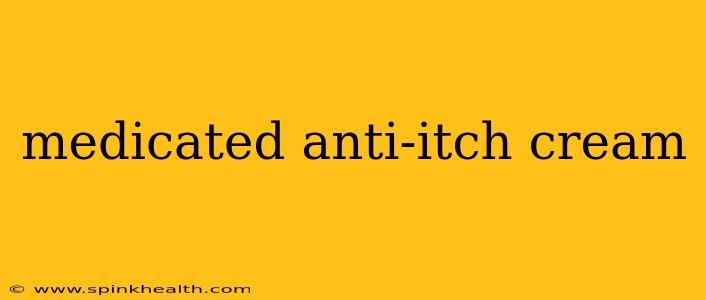Itching. That relentless, maddening sensation that drives you to scratch until your skin is raw. We've all been there. Whether it's a pesky mosquito bite, a stubborn rash, or the discomfort of eczema, the need for relief is immediate. That's where medicated anti-itch creams come in. But with so many options on the shelves, choosing the right one can feel overwhelming. This guide will help you navigate the world of anti-itch creams and find the perfect solution for your needs.
Imagine this: You’re enjoying a summer picnic, the sun is shining, laughter fills the air… then, the itching starts. A mosquito has found its mark, and the tiny welt is quickly becoming a major annoyance. You reach for your trusty tube of anti-itch cream, the cool sensation a welcome relief. This is the power of effective itch relief, and it's a feeling everyone deserves to experience.
What are Medicated Anti-Itch Creams?
Medicated anti-itch creams are topical treatments containing active ingredients designed to alleviate itching and inflammation associated with various skin conditions. Unlike simple moisturizers, these creams contain medications that directly target the source of the itch. They come in various formulations, strengths, and for different skin types and conditions.
What are the active ingredients in medicated anti-itch creams?
Several active ingredients are commonly found in medicated anti-itch creams, each with its unique mechanism of action. Let's delve into some of the most common:
Hydrocortisone:
This is a mild corticosteroid, frequently used to reduce inflammation and itching caused by various skin irritations like eczema, insect bites, and rashes. It works by suppressing the immune system's response in the affected area, thus reducing the inflammation that leads to itching.
Diphenhydramine (Benadryl):
This is an antihistamine, effective in combating itching associated with allergic reactions. Histamines are chemicals released by the body during an allergic response, causing inflammation and itching. Diphenhydramine blocks the action of histamines, offering relief from the itching.
Pramoxine:
A local anesthetic, pramoxine numbs the skin's nerve endings, providing temporary relief from itching. It's often used in combination with other active ingredients to enhance its effect.
Camphor and Menthol:
These ingredients create a cooling sensation on the skin, providing a soothing effect that can temporarily mask the itching sensation. They don't directly address the underlying cause of the itch but offer immediate comfort.
What are the different types of medicated anti-itch creams?
The type of cream you need depends largely on the cause and severity of your itch. Some common types include:
- Hydrocortisone creams: These are readily available over-the-counter (OTC) and suitable for mild to moderate itching.
- Antihistamine creams: Best for itching caused by allergic reactions.
- Combination creams: These often combine a corticosteroid with an antihistamine or local anesthetic for broader relief.
- Prescription creams: For more severe or persistent itching, a dermatologist may prescribe stronger creams containing potent corticosteroids or other medications.
How do I choose the right medicated anti-itch cream?
Choosing the right cream involves considering several factors:
- The cause of the itch: Is it an allergic reaction, an insect bite, eczema, or something else?
- The severity of the itch: Is it mild, moderate, or severe?
- Your skin type: Some creams are better suited for sensitive skin than others.
- Your age: Certain creams may not be appropriate for children or elderly individuals.
What are some common side effects of medicated anti-itch creams?
While generally safe, medicated anti-itch creams can cause side effects, particularly with prolonged use or use of stronger formulations. These can include:
- Skin thinning (with prolonged corticosteroid use)
- Burning or stinging sensation
- Skin irritation or allergic reactions
How long should I use medicated anti-itch cream?
Follow the instructions on the product label carefully. For OTC creams, use only as directed. If your itching persists or worsens despite treatment, consult a doctor or dermatologist. They can properly diagnose the underlying cause of your itch and recommend appropriate treatment.
When should I see a doctor about my itch?
If your itching is severe, persistent, widespread, or accompanied by other symptoms like fever, rash, or swelling, seek medical attention. A dermatologist can diagnose the underlying condition and provide effective treatment. Don't suffer in silence – professional help can provide the relief you need.
This journey towards itch-free skin starts with understanding your options. With the right information and a little bit of research, you can conquer that itch and rediscover comfort. Remember, always consult a healthcare professional if your symptoms persist or worsen. They are your best ally in the battle against that maddening itch.

